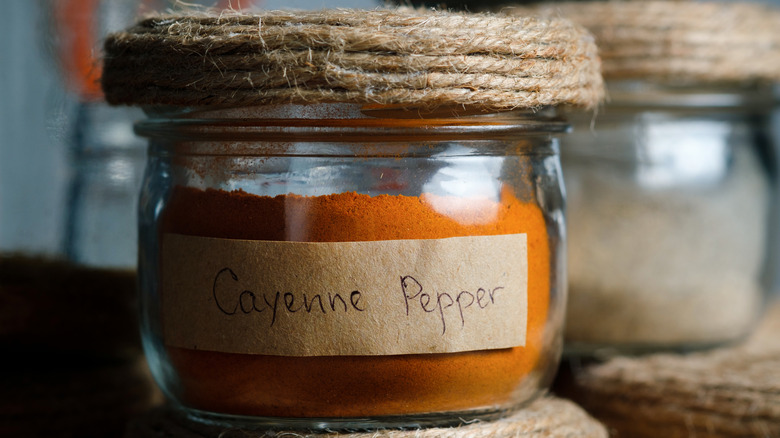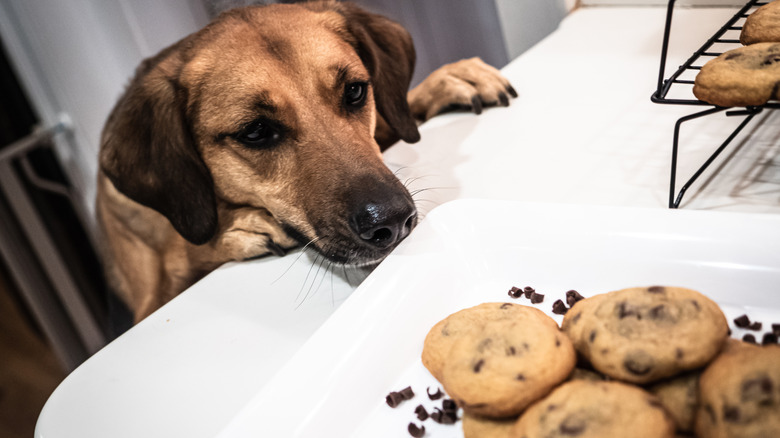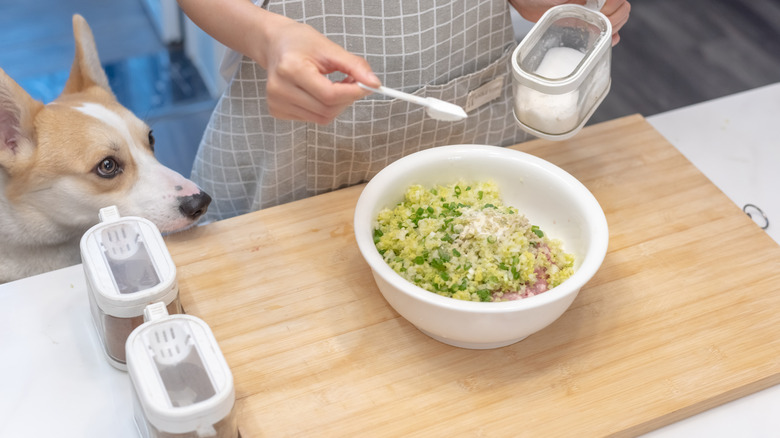5 Spices In Your Kitchen To Keep Far Away From Your Dog
Some of the biggest hazards to your pup might be tucked away in your kitchen cabinets or displayed on your countertop. While humans love to use different flavors to enhance their food, many common spices found in your home can actually be dangerous for your dog. Some may only cause minor issues; however, others can potentially lead to death.
Depending on the spice and amount consumed, your dog could experience symptoms ranging from throwing up and diarrhea to more severe issues such as seizures. Though some spices are toxic, there are also varieties that are safe for dogs in small amounts, such as cinnamon. When cooking or baking, it's always best to remain vigilant to ensure your pup doesn't end up eating a snack they shouldn't have.
1. Cayenne
Cayenne isn't considered toxic to dogs, but if you have any of this red spice in your kitchen, you'll still want to keep it far away from your pup. While cayenne is often used by owner's as a repellent to keep their pooches out of certain spaces or from chewing on things, this isn't a good idea due to the effects it can have on their body, even if it's technically non-toxic.
If your dog happens to eat cayenne, it can lead to gastrointestinal problems such as vomiting, diarrhea, and stomach pain. Even without ingestion, cayenne can also irritate your pup's throat, eyes, and nose just from coming into contact with it. If your canine happens to eat some cayenne powder, it shouldn't cause severe issues, but it's still best to monitor their state and get professional help if their symptoms worsen. Because of this, it's probably wise to keep this spice away from your dog altogether.
2. Cocoa powder
Cocoa powder gives our favorite chocolate dishes their flavor, but just like how chocolate is extremely toxic to dogs, cocoa powder is no different. In fact, cocoa powder is even more toxic to canines than regular chocolate. The danger comes from theobromine, a compound that can cause mild to moderate effects in dogs from consuming as little as 9 mg per pound of body weight. To put this into perspective, just a single gram of cocoa powder can contain up to 26 mg of theobromine.
According to VCA Animal Hospitals, some of the symptoms of cocoa powder poisoning include vomiting, diarrhea, increased thirst, rapid heart rate, and restlessness. More severe symptoms spans seizures, cardiac arrhythmias, and muscle tremors. If you suspect your dog has eaten any amount of cocoa powder, contact a veterinarian or pet poison control center or seek in-person help right away.
3. Garlic powder
A tasty addition to many meals, garlic powder is a popular seasoning found in spice cabinets all over. However, if your pup gets their paws on it, there will be consequences. Garlic is toxic to dogs, and garlic powder is considered one of the most dangerous forms for canines. The severity of symptoms are dependent on the amount of garlic powder your dog eats; however, it can cause vomiting and diarrhea, along with more severe issues if a large amount is consumed.
Garlic powder's danger comes from thiosulfate. If your dog ingests this compound, it can damage their red blood cells, leading to a condition called Heinz body hemolytic anemia. Symptoms of this type of anemia in canines include lethargy, rapid breathing, weakness, jaundice, and pale mucous membranes, per the American Kennel Club. If you think your dog ate garlic powder, contact a pet poison control center and monitor their condition closely or take them to an emergency vet.
4. Nutmeg
When baking with nutmeg, it's best to keep it away from your pup. Nutmeg is toxic to dogs, and can cause severe symptoms when ingested in large amounts. Like many other spices, the effects nutmeg has on your dog will depend on the amount they eat. A small dose of nutmeg will typically only cause gastrointestinal problems and isn't a major cause for concern, while larger amounts produce more dangerous issues.
Nutmeg's toxicity in dogs is derived from a compound called myristicin. If ingested in high quantities, PetMD states that myristicin can cause symptoms such as hallucinations, abdominal pain, seizures, disorientation, increased heart rate, and dry mouth. If you suspect your pup has eaten nutmeg, contact a veterinarian as soon as possible. If you think they ate a large amount of nutmeg, get veterinary help right away, as this can be fatal.
5. Salt and pepper
Salt and pepper tend to go hand in hand, and while this duo arguably encompasses two of the most common spices, they can cause issues for dogs in large quantities. If your pup happens to take a bite of your food seasoned with salt and pepper, there probably isn't a cause for concern. When it comes to pepper, luckily most canines do not enjoy the taste of it, so it's unlikely that they are going to ingest a lot. Even so, black pepper can still cause gastrointestinal issues, so it's still best to avoid this spice around your pooch.
Like with humans, salt is an essential mineral canines need, but too much salt is unhealthy for dogs. Eating large amounts can result in salt toxicosis, where the level of sodium in your pup's bloodstream is too high and can cause cell damage. Salt toxicosis is rare, and happens when your dog consumes a large amount of salt all at once, rather than something that gradually accumulates over multiple days.





